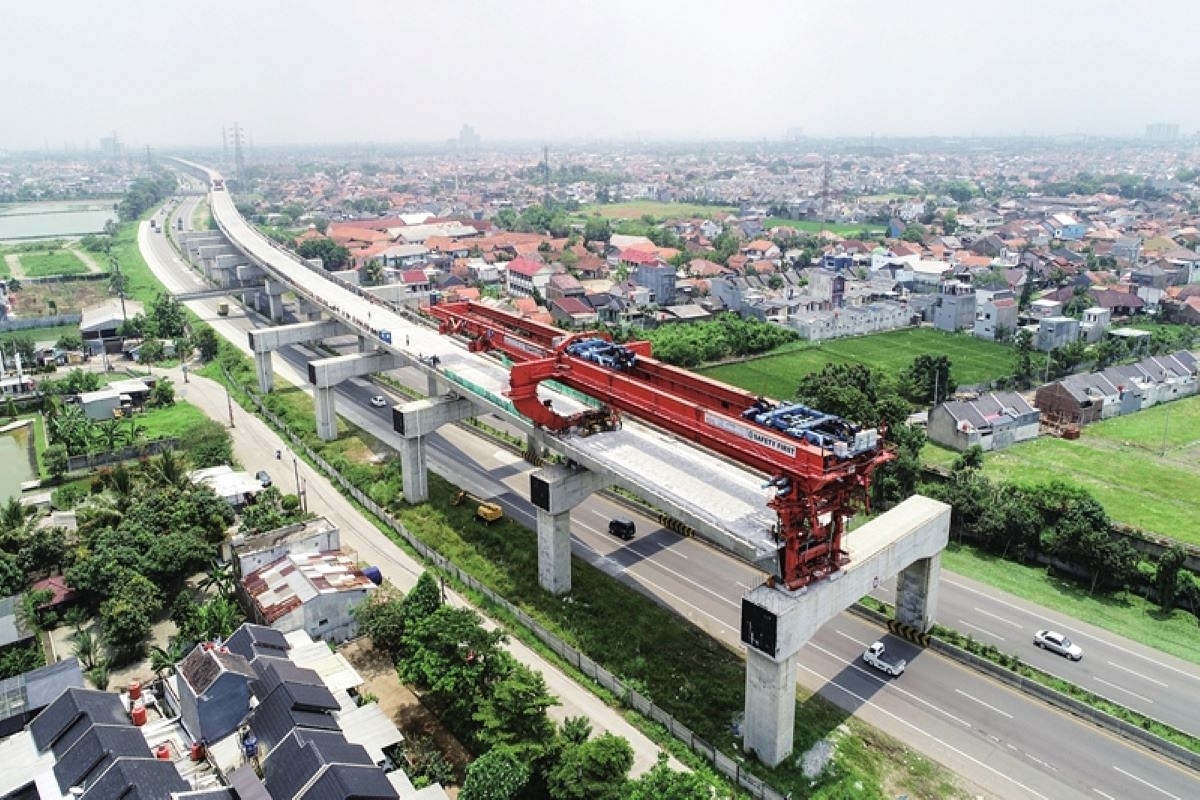News Brief
Indonesia High-Speed Rail: Work On Beijing-funded Project Halted Over Safety Concerns After 2 Chinese Workers Die In Train Derailment
- The construction work began in 2016, and the project was originally expected to be complete by 2019. However, it has been hit by delays due to disputes that involved the land acquisition and environmental issues.
- Trial operations on the railway line are expected to be conducted in November 2022. The project is set to commence operations by June 2023.

Indonesia's Jakarta-Bandung HSR
Construction of Indonesia's first high-speed train has been put temporarily halted over safety fears after a weekend accident killed two Chinese workers and injured four other technicians.
The mishap over the weekend is the latest safety lapse to hit the US$ 7.8 billion project, that is racing against time to commence a 142-km high-speed rail service connecting the country's capital, Jakarta and Bandung, a city in West Java province, by June 2023.
The trains involved in the accident were not high-speed “but a series of working trains in the form of work locomotives and rail installation machine”, according to a statement released by PT Kereta Cepat Indonesia-China (KCIC), the joint venture between Indonesian and Chinese consortiums behind the project.
The project is already facing cost overruns due to a host of issues, including higher land acquisition costs, delays in construction due to the pandemic, and rising materials prices.
In November, China's president Xi Jinping and his Indonesian counterpart Joko Widodo inspected the railway's progress through a video link.
The project is a part of China's strategic Belt and Road infrastructure initiative, with 75 per cent of the cost funded via a loan from the China Development Bank. The remaining 25 per cent is the consortium's funds. The Chinese loan will be for 40 years with a ten-year grace period.
KCIC was set up in October 2015 as a consortium of four Indonesian state-owned companies and China Railway International, a subsidiary of China Railway Group (CREC). While Indonesian entities hold 60 per cent equity in the joint venture, the Chinese firm holds the remaining 40 per cent equity.
In November 2022, KCIC sought a $1.03 billion loan top-up from China Development Bank (CDB) to fund a budget overrun of the ambitious project.
In August 2022, the Indonesian government announced a gap funding of $274 million to PT KAI to expedite the project's construction.
The Indonesian government picked China for the project due to its readiness to provide guarantee-free loans, Japan, which was also in the requested, lost out as it requested Indonesian Government funding.
High-Speed Rail Project Developed In Phases
As part of the first phase of the high-speed rail project, a 142 km stretch is being developed connecting Jakarta, the country's capital and Bandung, a city in West Java province.
Once commissioned, the high-speed rail service will reduce the travel time between two cities from the current three hours to about 40 minutes. The train will run at an approximate speed between 200 kmph and 350 kmph. Daily passenger flow on the rail link is expected to be 44,000 on average, with this number set to increase in later years. More than 80 km of the total length of the railway line will be elevated, while the remaining will be through 13 tunnels and subgrades.
Nearly 90 per cent of the civil works related to the construction of subgrade, bridges, and stations are complete.
The overall project envisages the development of a 750 km high-speed train line that would cut across four provinces on the main island of Java and end in the country's second-largest city of Surabaya.
Delay in commissioning
The construction work began in 2016, and the project was originally expected to be complete by 2019. However, it has been hit by delays due to disputes that involved the land acquisition and environmental issues.
Trial operations on the railway line are expected to be conducted in November 2022. The project is set to commence operations by June 2023.
In September, an initial set of Chinese-made train cars for the high-speed railway project reached Jakarta's port. The train cars were designed and built by China's CRRC Qingdao Sifang railway company.
Support Swarajya's 50 Ground Reports Project & Sponsor A Story
Every general election Swarajya does a 50 ground reports project.
Aimed only at serious readers and those who appreciate the nuances of political undercurrents, the project provides a sense of India's electoral landscape. As you know, these reports are produced after considerable investment of travel, time and effort on the ground.
This time too we've kicked off the project in style and have covered over 30 constituencies already. If you're someone who appreciates such work and have enjoyed our coverage please consider sponsoring a ground report for just Rs 2999 to Rs 19,999 - it goes a long way in helping us produce more quality reportage.
You can also back this project by becoming a subscriber for as little as Rs 999 - so do click on this links and choose a plan that suits you and back us.
Click below to contribute.
Latest